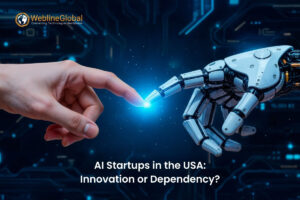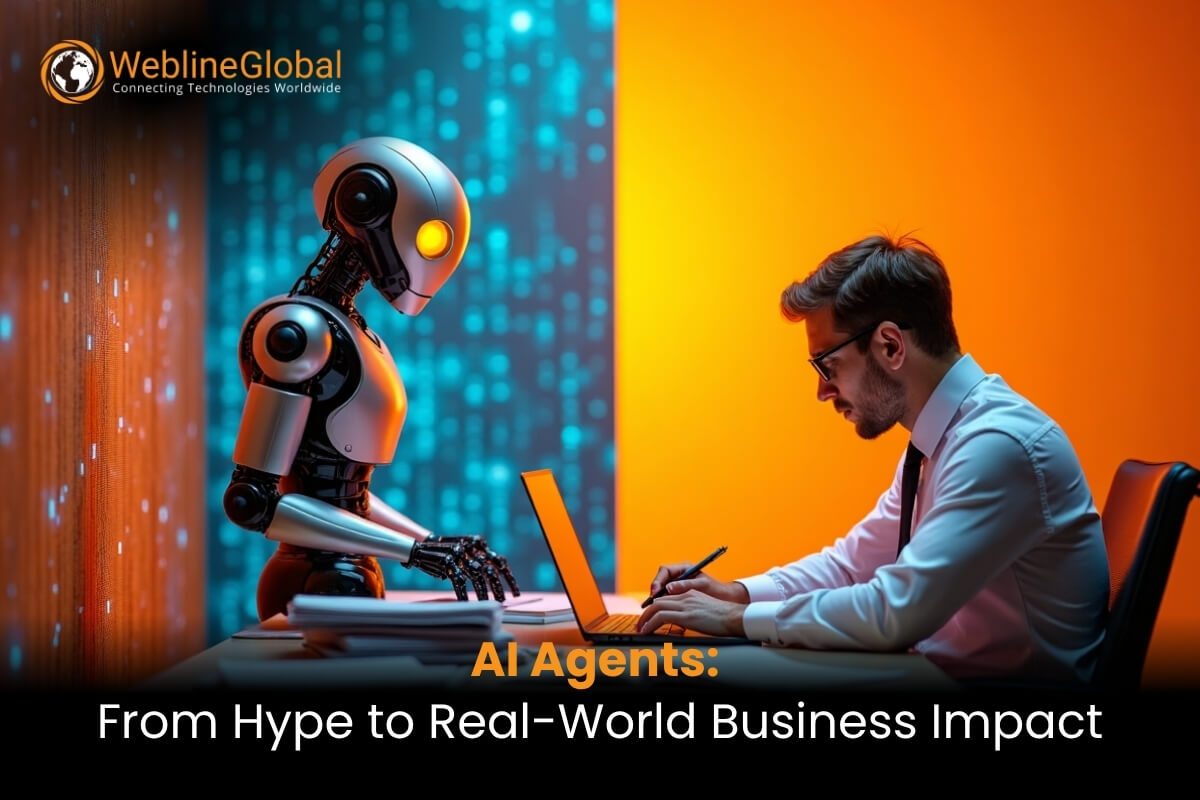
Artificial Intelligence (AI) is no longer a futuristic concept; it’s here, and it’s rapidly changing the way businesses operate. AI agents—intelligent systems that can perform tasks autonomously, analyze data, and interact with users—are at the heart of this revolution. In fact, many AI startups in USA are leading the way in building innovative AI-driven solutions that reshape industries worldwide.
According to a recent study as stated by Salesforce, 93% of IT leaders acknowledge the potential value of AI agents. Yet, despite this overwhelming enthusiasm, a significant majority struggle to deploy them successfully in real-world environments. The disparity between understanding AI’s promise and reaping its actual benefits underscores a critical challenge businesses face today.
Ready to Implement AI Agents for Your Business? Let’s Make It Happen!
At WeblineGlobal, we understand this challenge deeply. We specialize in helping organizations not only grasp the potential of AI agents but also implement them effectively, ensuring that the promises of enhanced efficiency, automation, and improved customer experiences become tangible realities.
The Exciting Potential of AI Agents
AI agents are more than just a trend—they are poised to be a transformative force in industries ranging from customer service to logistics, healthcare to finance. The benefits of AI agents are profound and far-reaching.
Consider the following possibilities:
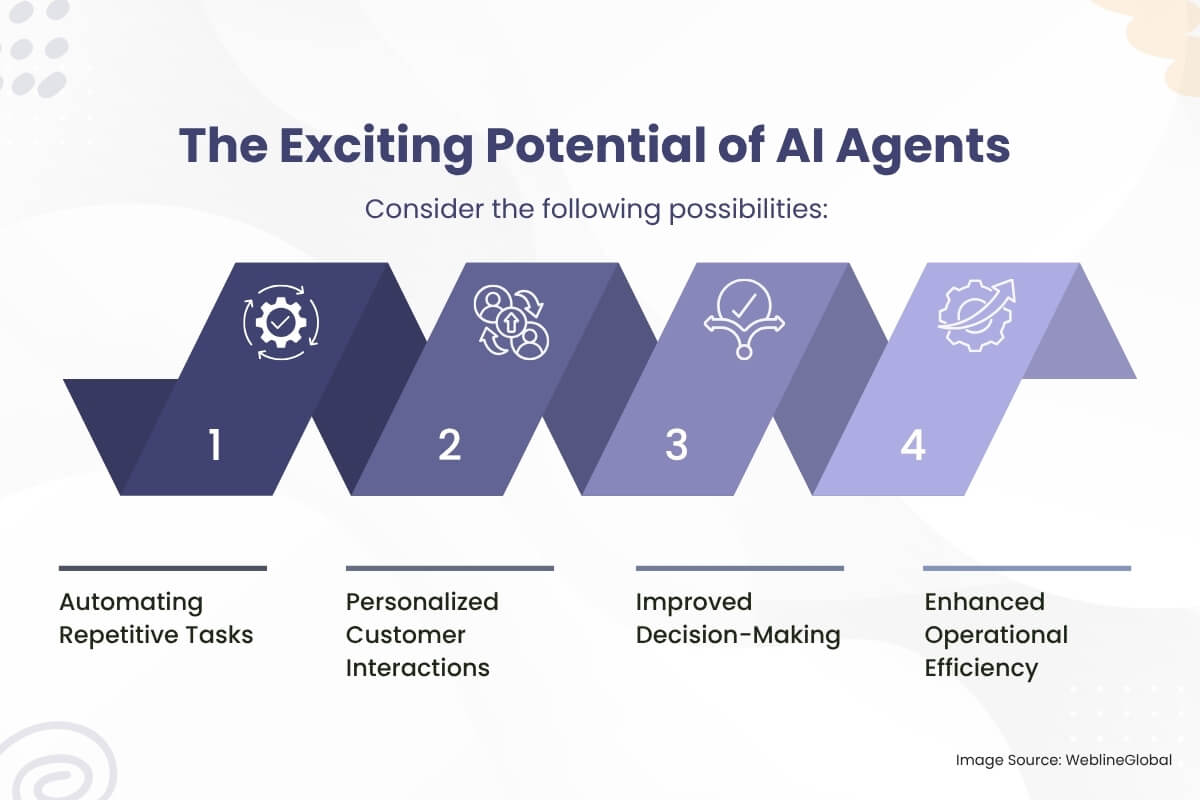
1. Automating Repetitive Tasks
Imagine intelligent virtual assistants taking over time-consuming, repetitive tasks such as answering common customer inquiries, processing data, or managing schedules. This allows human employees to focus on more strategic and creative responsibilities, driving greater productivity and innovation.
2. Personalized Customer Interactions
AI agents can analyze vast amounts of data to personalize customer experiences in real time. Whether it’s tailoring marketing campaigns to individual preferences or offering customized product recommendations, AI-driven personalization can lead to higher customer satisfaction and loyalty.
3. Improved Decision-Making
AI agents can sift through large volumes of data to extract valuable insights and provide recommendations. By helping businesses make data-driven decisions, AI can optimize processes, enhance resource allocation, and improve forecasting accuracy.
4. Enhanced Operational Efficiency
AI agents can automate routine operational tasks such as inventory management, appointment scheduling, and employee training, helping businesses streamline processes, reduce errors, and save time.
Despite these benefits, many organizations find themselves stuck in the early stages of AI adoption, unable to bridge the gap between enthusiasm for the technology and realizing its full potential.
Understanding the Disconnect: Why Many Companies Struggle to Implement AI Agents
The enthusiasm for AI agents is undoubtedly high, but achieving a successful AI deployment is another matter entirely. Many businesses encounter obstacles that prevent them from successfully implementing AI agents and unlocking their true potential.
Some of the most common challenges include:
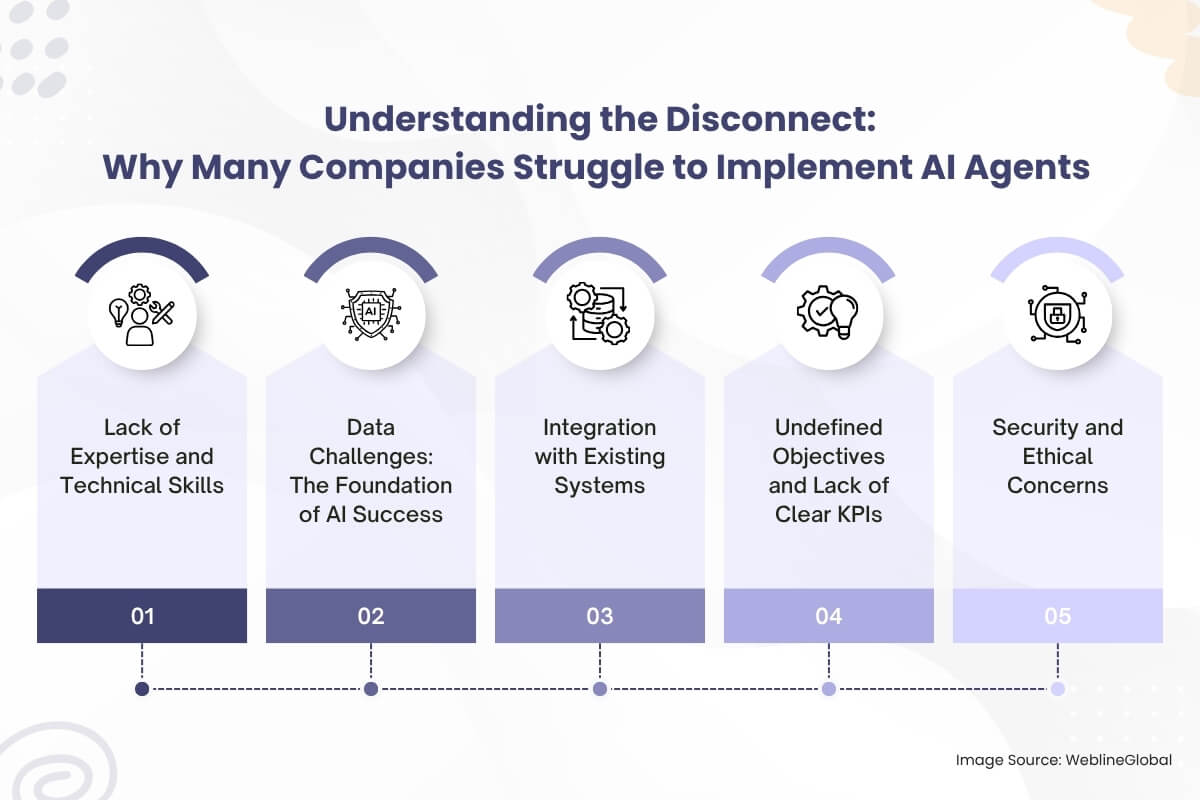
1. Lack of Expertise and Technical Skills
One of the primary reasons businesses struggle with AI implementation is the lack of in-house expertise. Developing and deploying AI agents requires a deep understanding of several advanced technologies, including natural language processing (NLP), machine learning (ML), deep learning, and data science. These technologies are complex, and not every organization has the internal capability to develop them in-house.
AI agent development also requires specialized skills in areas like algorithm development, data engineering, and software architecture. Without the right talent, companies may find it difficult to build and maintain effective AI systems that align with their business objectives.
2. Data Challenges: The Foundation of AI Success
AI agents rely heavily on high-quality data to function effectively. Data is the foundation on which AI agents learn, make decisions, and interact with users. However, many organizations face significant challenges in terms of data quality, availability, and integration.
- Data Quality: AI agents are only as good as the data they’re trained on. If the data is incomplete, inconsistent, or noisy, it can undermine the performance of AI systems. For example, an AI agent trained on biased data may make biased decisions or provide inaccurate responses to customers.
- Data Accessibility: For AI agents to function optimally, they need access to clean, structured, and relevant data. However, many businesses store their data in silos, making it difficult for AI systems to access the information they need in real time.
- Data Integration: Integrating AI agents into existing systems often involves connecting them to a variety of data sources. These sources may use different formats, structures, or platforms, making integration a complex and time-consuming task.
3. Integration with Existing Systems
AI agents don’t operate in isolation; they need to be integrated into your organization’s existing workflows and IT systems. Seamless integration is crucial to ensure that AI agents can interact with other tools, databases, and platforms without causing disruption.
However, integration isn’t always straightforward. Businesses often have legacy systems that weren’t designed with AI in mind. As a result, integrating AI agents with older technologies may require significant changes to existing infrastructure, which can be costly and time-consuming.
4. Undefined Objectives and Lack of Clear KPIs
While AI agents offer numerous possibilities, many businesses fail to clearly define the objectives they want to achieve through AI implementation. Without clear, well-defined goals, it’s difficult to measure success or understand whether the deployment is actually delivering value.
For example, a business might deploy an AI-powered chatbot for customer service without first defining key performance indicators (KPIs) such as response time, customer satisfaction, or issue resolution rates. As a result, it becomes challenging to evaluate the performance of the AI system or identify areas for improvement.
5. Security and Ethical Concerns
AsI implementation also raises significant security and ethical concerns. AI systems often handle sensitive data, such as customer information or financial records, which means organizations need to ensure that these systems comply with privacy regulations and safeguard data from cyber threats.
Moreover, AI agents must be developed and used in an ethical manner. Issues such as algorithmic bias, transparency, and accountability are critical to ensure that AI systems make fair, unbiased decisions and don’t inadvertently harm users or stakeholders.
Struggling to Integrate AI Seamlessly? Our Experts Can Help!
How WeblineGlobal Can Help You Bridge the Gap?
At WeblineGlobal, we specialize in helping organizations overcome these challenges and successfully deploy AI agents that deliver real-world results. Whether you are in the early stages of AI exploration or looking to scale your existing AI initiatives, we offer a comprehensive range of software development services and consultation that guide you through every phase of AI implementation—from initial strategy development to ongoing support.
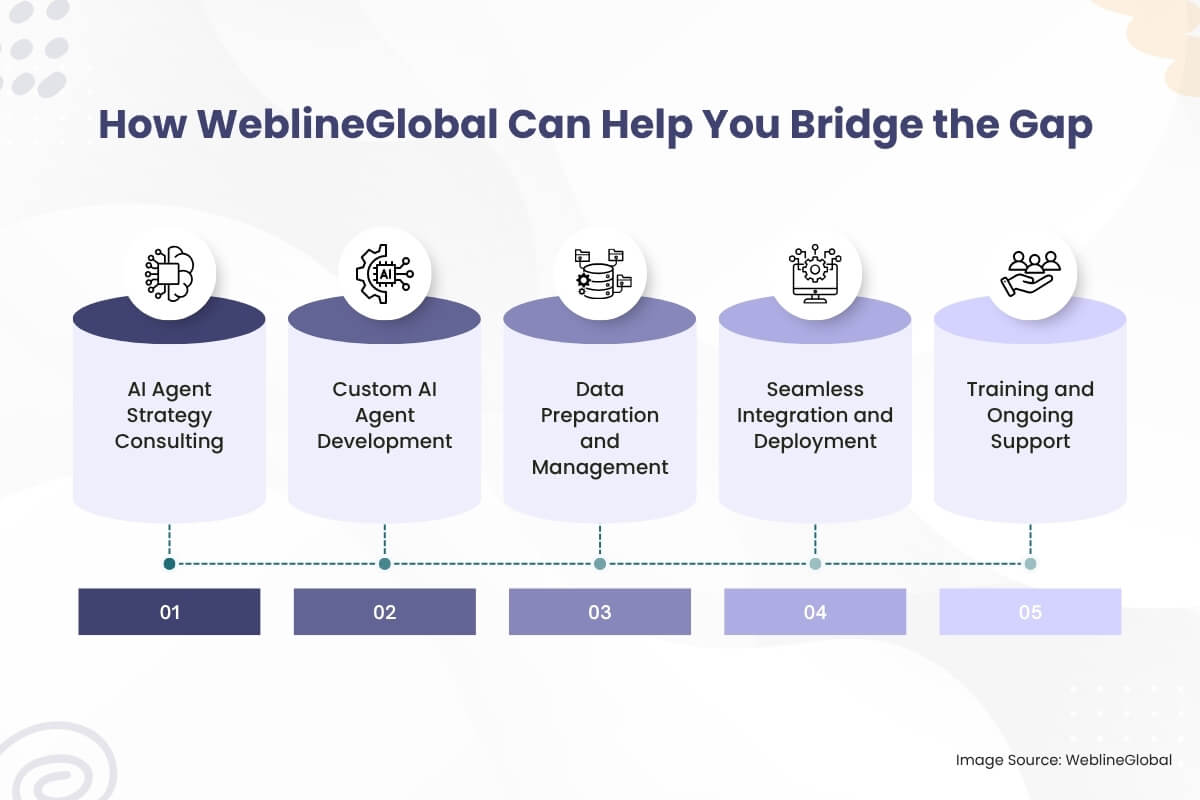
1. AI Agent Strategy Consulting
Before diving into AI development, it’s essential to have a clear strategy. Our AI strategy consulting services focus on aligning your AI initiatives with your business goals. We work with you to:
- Define your AI agent objectives: Understand what you want to achieve and how AI can help.
- Identify the right use cases: Determine which areas of your business would benefit most from AI agents.
- Develop a roadmap: Create a step-by-step plan for successful AI deployment that aligns with your timelines and resources.
2. Custom AI Agent Development
WeblineGlobal believes in customized solutions; we understand that every business is unique, which is why we design AI agents tailored to your specific needs. Our team of experts builds AI agents that are capable of:
- Natural language understanding and generation: Enabling human-like conversations in chatbots, virtual assistants, and more.
- Decision support: Helping you make data-driven decisions with AI systems that analyze trends, predict outcomes, and offer actionable insights.
- Automation: Building systems that can automate tasks such as data entry, customer queries, and routine operations.
Our AI agents are built using the latest technologies and best practices to ensure they are efficient, reliable, and scalable.
3. Data Preparation and Management
As AI relies heavily on data, we assist with data preparation and management to ensure that the data used to train your AI agents is high-quality, secure, and easily accessible. Our services include:
- Data cleaning: Removing inaccuracies and inconsistencies from your data.
- Data structuring: Organizing and formatting data so that it can be effectively used by AI systems.
- Data integration: Ensuring that all relevant data sources are connected to your AI systems in real time.
4. Seamless Integration and Deployment
We understand the importance of smooth integration. Our team works closely with your IT department to ensure that AI agents integrate seamlessly with your existing systems and workflows. We minimize disruption and maximize the efficiency of your operations.
- System compatibility: Ensuring that AI agents are compatible with your current infrastructure.
- Minimal disruption: Implementing AI solutions with minimal downtime or impact on daily operations.
- Scalability: Designing systems that can grow with your business and adapt to new challenges.
5. Training and Ongoing Support
We don’t just build AI agents and leave you to figure them out on your own. Our training programs are designed to ensure that your team is fully equipped to manage and use AI systems effectively. Additionally, we provide ongoing support to address any issues, updates, or optimizations that may arise post-deployment.
Unlocking the Full Potential of AI Agents
The world of AI agents offers vast opportunities, but achieving success requires more than just enthusiasm—it requires strategic planning, technical expertise, and the right partner to guide you through the process. At WeblineGlobal, we specialize in helping businesses like yours harness the power of AI to streamline operations, improve customer experiences, and drive growth.
Contact us today to learn how we can help you bridge the gap between AI agent enthusiasm and real-world success. Together, we can bring your AI vision to life and unlock the full potential of AI for your organization.
Let’s transform your business with the power of AI agents.
Social Hashtags
#AIAgents #BusinessAutomation #ArtificialIntelligence #AIinBusiness #SmartSolutions #AIForEnterprises #TechInnovation #ProcessAutomation #NextGenAI
Unlock AI’s Full Potential with Our Custom Solutions! Get Expert Guidance Today!
